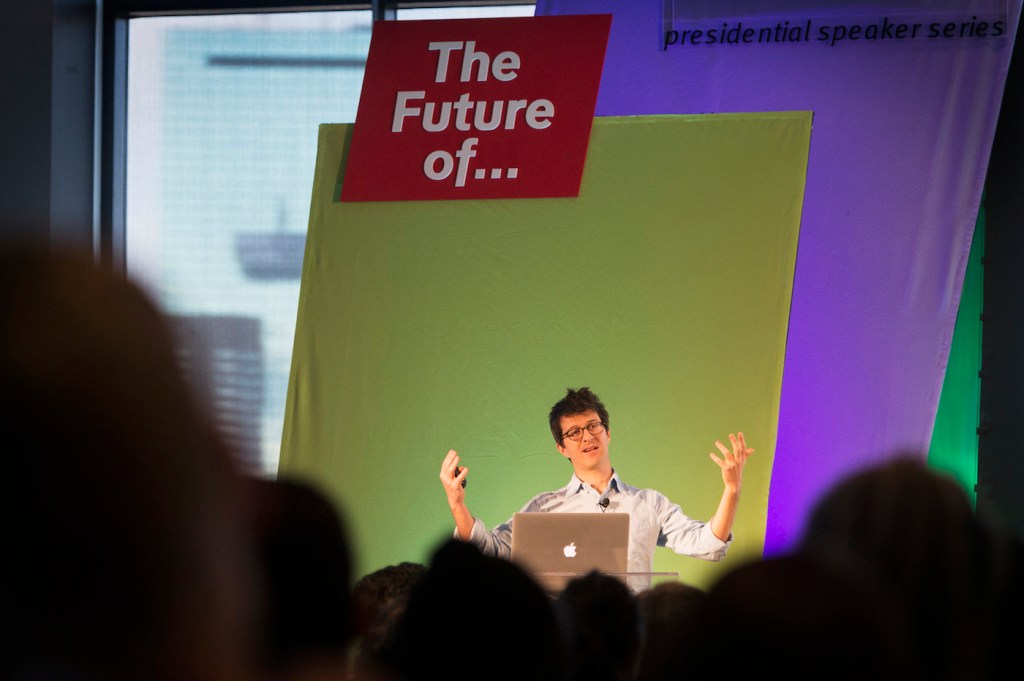What can Big Data teach us about dating?

What better time to explore the intersection of love and mathematics?
It was Thursday afternoon, just three days before Valentine’s Day, and OkCupid co-founder Christian Rudder was speaking at Northeastern University.
His talk—which included a brief overview of the irreverent dating site as well as a lengthy Q&A with President Joseph E. Aoun and members of the university community—marked the first installment of “The Future of…,” a new presidential speaker series.
Here are five takeaways from the quirky conversation, which was held in event space on the 17th floor of East Village, whose high-top tables were dotted with heart-shaped candy.
‘All the guys want to talk to the hottest girls’
Rudder and his trio of co-founders launched OkCupid in 2004 and then founded a blog called OkTrends in 2009, offering up data-driven assessments of user behavior. The findings—white women prefer white men to the exclusion of everyone else, 2/3 of male messages go to 1/3 of the women—drew coverage from The New York Times, The New Yorker, and The Atlantic.
“It’s not surprising that all the guys want to talk to the hottest girls,” said Rudder, who led OkCupid’s analytics team. “A lot of what we saw in the data confirmed our cynical intuition about how people get together.”
His best-selling book Dataclysm: Who We Are When We Think No One’s Looking picks up where the blog leaves off, exploring everything from what tweets can tell us about modern communication to what Facebook friendships say about the stability of a marriage. As he writes in the introduction, “The idea is to move our understanding of ourselves away from narratives and toward numbers, or, rather, to think in such a way that numbers are the narrative.”
‘Dating sucks’
As CEO of OkCupid, Rudder rarely heard from satisfied users. “I would wager that most people using OkCupid don’t like it, because dating sucks,” he explained. “It causes frustration and induces anxiety.”
The dating site’s biggest proponents don’t have time to offer praise. As Rudder joked, “I don’t hear from them because they’re off getting married.”
Diversify your social network
A Facebook user asked him for tips for starting a business. “Find co-founders you really like and who have skill sets that compliment your own,” Rudder replied. “You can’t found a company with three dudes who are all good at C++ and then hope for the best. You have to find people who can do different things.”
The same principle applies to daily life. Whether or not you want to create a startup, look to diversity your social network: “Having friends who are different from you is rare,” he said, “but if you manage to do that, you could start a company.”
OkCupid is a prime example, a particularly successful venture whose co-founders each claimed one area of expertise. There was the businessman, the web designer, and the programmer. And then there was Rudder the writer, who “liked to do editorial stuff.”
The beauty of Tinder
The questions kept coming: “Did you enjoy managing?” Aoun asked. “No,” Rudder replied. “Why not?” Aoun countered. “It’s like dating.”
When a student asked him to name the next big online dating disruptor, Rudder reflected on Tinder, the app that harnessed the power of Facebook to take the industry by storm. “OkCupid always tried to make things cleaner and easier to use,” he said, “and Tinder did that abruptly.”
According to Rudder’s finely honed digital eye, the next online dating app will be hard-pressed to survive for long. The industry is crowded, he said, with strong options for those looking to find love on the Internet. “It will be a tough row to hoe for anybody looking to start a new dating app at this point,” he explained. “I don’t think people appreciate how hard it is to design a dating site that makes people even slightly happy about dating.”
Two apps are better than one
If he were to look for his perfect match on the Web, Rudder would join Tinder and OkCupid. Single men and women don’t limit themselves to finding love in one place, like a class or a party, he said, so why would he limit himself to swiping right on one solitary app? He wouldn’t: “Before the advent of apps, you might have met a few of your girlfriends in bars,” he explained, “but that doesn’t mean you’re not going to go to house parties anymore.”





